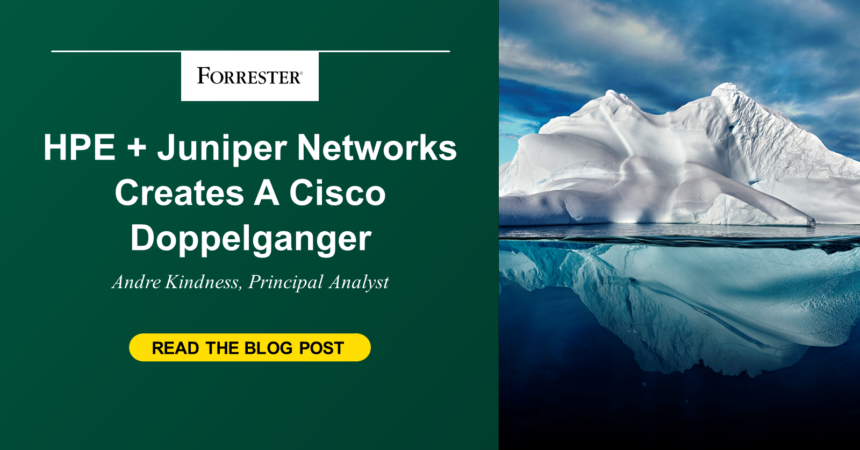Some news you expect, some you don’t. I’ll be honest — I didn’t expect this and would have bet against the idea if someone told me about it yesterday. HPE is acquiring Juniper Networks.
I’ve had a couple days to process it, and during that time, I had an epiphany. Thinking back to early 2023 at Aruba’s Atmosphere conference, it hit me why HPE is making this move, which is a very different approach from Aruba’s past. Aruba’s founders — Keerti Melkote and Pankaj Manglik — and the CEO credited with their rise, Dominic Orr, grew the business by challenging the fat access point (AP) approach in the early 2000s with a unique vision on managing a wireless network. The new executives at Aruba (HPE) from Silver Peak, HPE, and Axis see acquisitions as the way to grow the networking business. At first glance, buying Juniper might seem like a poor approach given its many overlaps (i.e., both companies have switching and wireless product lines), but there is more to this than you think. Much of Juniper’s products and IP would take HPE too long to create organically, and it would be too messy if the company tried to buy different pieces, like Extreme Networks did with Enterasys, Motorola, Aerohive, Avaya, and Brocade. HPE needs a big fish if it is going to hit its targets quickly.
Here is what HPE is getting out of a Juniper acquisition:
- Artificial intelligence. Juniper’s AI product, called Marvis (part of the Mist acquisition in 2019), is by far the most advanced AI solution in the networking market. That’s not a profound statement; no vendor has anything close to it. The quick history: Juniper’s acquisition of Mist brought the company a cloud-based Wi-Fi solution with a leading AI capability, Marvis. Juniper quickly started integrating its switching and routing portfolio into Marvis. Walmart, Amazon, and others took notice. Fast-forward to today: This gives HPE Aruba a two-year lead against its competitors by bringing Juniper into the fold.
- A serious data center switching solution. HPE has had many starts, yet it has always fizzled when it comes to data center solutions that ranged from 3Com switches to the recent Aruba CX switches. None of them stood up to what Arista, Cisco, and Juniper offered. Now, Aruba has Juniper’s data center switching line and robust OS, Junos.
- Real cloud-based management and monitoring. I think we can all agree that traditional networking vendors don’t excel at building intuitive modern software. Specifically, none of them could create good, simple cloud-based management and monitoring solutions for switches and APs. This is the key reason why Cisco bought Meraki, Juniper bought Mist, and Extreme Networks bought Aerohive. For HPE Aruba, shifting Central into the cloud wasn’t turning out to be easy. Now, HPE Aruba will have Mist.
- A foothold in the service provider market. Other than Cisco, Juniper is the only enterprise networking vendor that has a strong presence in the cloud and telecom market. Juniper brings in about $2 billion in annual revenue from the SP market, which is roughly 40% of the company’s 2023 revenue. HPE has been trying to get a networking foothold into the 5G market so it can bring in more Silver Peak sales, which also capitalizes on the 2023 private 5G Athonet acquisition.
- A strong security story. Through this acquisition, HPE aims to further bolster its growing security portfolio by gaining Juniper’s enterprise firewall (which performed well in our most recent evaluations) and its cloud sandbox, complete with a competent threat intelligence team. It is not clear, however, whether Juniper’s “Connected Security” strategy, where switches participate in a security mesh, will find a forever home in a conglomerate like HPE. HPE introduced a similar feature to its CX lineup, which brings application visibility and policy enforcement at the switch. But this recent enhancement sought to position its CX switches as an enterprise firewall alternative, and it may be too soon in its rollout to determine its merit.
What does this mean for the competition?
- Arista Networks. While many might see this acquisition as hurting Arista, I actually see it as a win. Arista will be the only company to offer a single network operating system with a clear and succinct networking focus. The other vendors will be spending countless resources trying to clean up piles of acquired products. Juniper resellers, which have a strong set of technical skills and client lists, will probably shift to Arista Networks.
- While Cisco lacks AI capabilities, the company has made an about-face and has about a year’s head start in cleaning up and slimming down its massive portfolio; Aruba has yet to start. But Cisco won’t be the only vendor with a head start; Cisco must deal with the second- and third-place vendors coming together and creating a comparable switching and routing portfolio that addresses both the enterprise and SP markets.
What does this mean for you?
I’m not going to sugarcoat it. As with any acquisition, the journey ahead will be rife with obstacles for Juniper and HPE/Aruba customers alike. As this high-level merger unfolds, the company will seek to:
- Create a unique strategy that doesn’t just say “I’m a different type of Cisco.” Take a look at my blog on the strategy axis in a Forrester Wave™ evaluation. This should provide you with some things to think about and questions to ask. Don’t accept what you read over the next week or vendor marketing slides, press reports, or what other blogs say. This will take some time to work out. Vendors typically promise bigger and more options via a classic “better together” story. But that isn’t a vision and strategy. More options lead to more complexity, and it takes a long time to get there.
- Rationalize/optimize the portfolio, the products, and the solutions. While HPE will try to reassure you that nothing will change, it doesn’t make sense to keep everything, especially the multiple AP product lines (Instant On, Mist, and Aruba APs), all the routing and switching operating systems (Juno, AOS-CX, and ArubaOS), and both management systems (Central and Mist). Though not immediately, products will need to go, and the hardware that stays will need to be changed to accommodate cloud-based management, monitoring, and AI. This happened at Cisco with its routing, switching, and wireless product lines after the company acquired Viptela and Meraki. My bet? I believe that Aruba Central will be phased out for Mist. This will take a few years to happen. If HPE stops adding features to Aruba Central, then take that as a sign that Mist is taking over here.
- Remove channel and sales redundancy. During M&A activity of alike portfolios, sales redundancies are eliminated. This will rock the channel and cause a lot of channel conflict between HPE Aruba and Juniper resellers. Juniper resellers will stay with Juniper for some time but will ultimately either drop the portfolio — unless the VAR was an HPE reseller — or pick up Arista.








